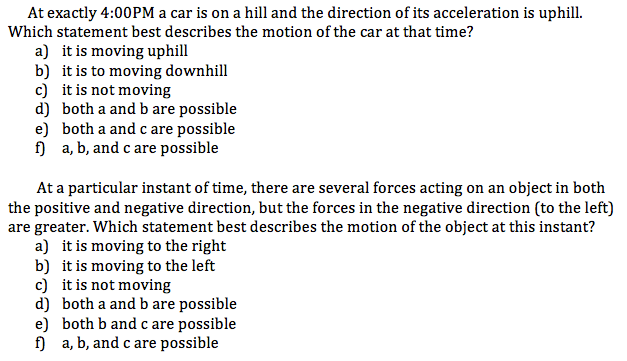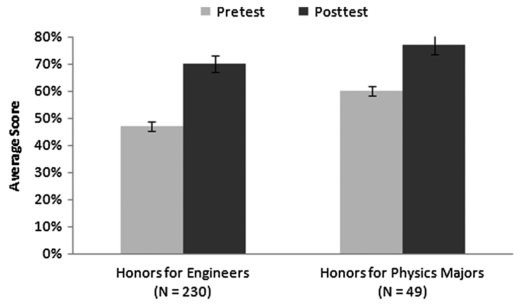Developed by Rebecca Rosenblatt and Andrew Heckler
| Purpose | To assess students’ understanding of the relationships between the directions of force, velocity, and acceleration in one dimension. |
|---|---|
| Format | Pre/post, Multiple-choice, Multiple-response |
| Duration | 20 min |
| Focus | Mechanics Content knowledge (forces, velocity, acceleration) |
| Level | Intro college |
Sample questions from the FVA:

FVA Implementation and Troubleshooting Guide
Everything you need to know about implementing the FVA in your class.
Login or register to download the implementation guide.
more details
This is the third highest level of research validation, corresponding to at least 3 of the validation categories below.
Research Validation Summary
Based on Research Into:
- Student thinking
Studied Using:
- Student interviews
- Expert review
- Appropriate statistical analysis
Research Conducted:
- At multiple institutions
- By multiple research groups
- Peer-reviewed publication
The multiple-choice questions on the FVA test were developed using open-ended responses and revised iteratively using student interviews. There were two major iterations of test development. Appropriate statistical analyses of reliability were conducted and the FVA test was found to have a reasonably high reliability. The FVA test was given to over 1100 students at the developers’ institution who were enrolled in calculus-based physics courses for standard and honors students. As the course-level increased, so did the scores on the FVA test. There is a relatively strong correlation of FVA test score with FCI score and a moderate correlation with final grade. Student responses to FVA test questions are relatively insensitive to changes in the story context of the questions. The FVA test has primarily been used at the developers’ institution in calculus-based courses. There are three peer-reviewed publications presenting FVA test data.
References
- R. Rosenblatt and A. Heckler, Systematic study of student understanding of the relationships between the directions of force, velocity, and acceleration in one dimension, Phys. Rev. ST Phys. Educ. Res. 7 (2), 020112 (2011).
- R. Rosenblatt, E. Sayre, and A. Heckler, Toward a Comprehensive Picture of Student Understanding of Force, Velocity, and Acceleration, presented at the Physics Education Research Conference 2008, Edmonton, Canada, 2008.
- R. Rosenblatt, E. Sayre, and A. Heckler, Modeling students’ conceptual understanding of force, velocity, and acceleration, presented at the Physics Education Research Conference 2009, Ann Arbor, Michigan, 2009.
We don't have any translations of this assessment yet.
If you know of a translation that we don't have yet, or if you would like to translate this assessment, please contact us!
| Typical Results |
|---|
Typical results from Rosenblatt and Heckler 2011:
|
The latest version of the FVA, released in 2009, is version 3.2.3a.




